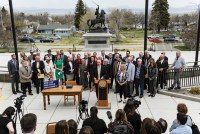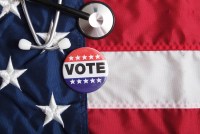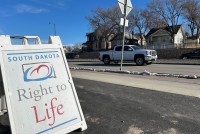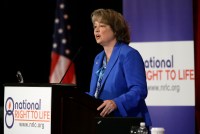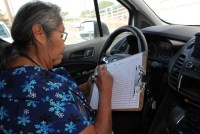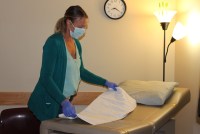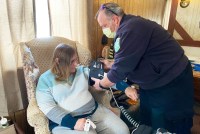Latest KFF Health News Stories
Montana, an Island of Abortion Access, Preps for Consequential Elections and Court Decisions
A 25-year-old state Supreme Court ruling protects abortion rights in conservative Montana. That hasn’t stopped Republicans and anti-abortion advocates from trying to institute a ban.
America Worries About Health Costs — And Voters Want to Hear From Biden and Republicans
The presidential election is likely to turn on the simple question of whether Americans want Donald Trump back in the White House. But health care tops the list of household financial worries for adults from both parties.
A Government Video Would Explain When Abortion Is Legal in South Dakota
South Dakota allows doctors to terminate a pregnancy only if a patient’s life is in jeopardy. Lawmakers say a government-created video would clarify what that exception actually means.
The Powerful Constraints on Medical Care in Catholic Hospitals Across America
The expansion of Catholic hospitals nationwide leaves patients at the mercy of the church’s religious directives, which are often at odds with accepted medical standards.
Native American Communities Have the Highest Suicide Rates, Yet Interventions Are Scarce
Native Americans die by suicide at a higher rate than any other racial or ethnic group, yet research into effective and culturally appropriate interventions is uncommon.
What a Bison Goring Can Teach Us About Rural Emergency Care
Millions of Americans live in “ambulance deserts” — areas that are more than a 25-minute drive to the nearest emergency medical services (EMS) station. The most rural areas can be more than an hour away from help. These sparsely populated communities can have trouble sustaining ambulance services, if small patient volumes and low reimbursements […]
Doctors on (Video) Call: Rural Medics Get Long-Distance Help in Treating Man Gored by Bison
A rural South Dakota medic said using an ambulance video system to communicate with a doctor gave him peace of mind as he treated a patient who was seriously injured when gored by a bison.
‘Forever Chemicals’ in Thousands of Private Wells Near Military Sites, Study Finds
New research finds that private wells near more than 82% of select military sites were contaminated with PFAS chemicals.
Anti-Abortion Groups Shrug Off Election Losses, Look to Courts, Statehouses for Path Forward
Anti-abortion groups have lost seven consecutive elections on state ballot measures about abortion. They say they’re unfazed and plan to keep focusing on lawmakers and courts to notch wins.
Iowa’s Governor Opposes Abortion — And Has Final Say on Whether Medicaid Pays for It
The federal government requires state Medicaid programs to pay for abortions in limited circumstances, but Iowa hasn’t done so for years. No providers seek Medicaid payments, which require the approval of the governor, an anti-abortion Republican.
Rural Nursing Home Supporters Fear Proposed Staffing Standards Will Trigger More Closures
The Biden administration says a recently proposed minimum staffing standard would help ensure quality care, but nursing home leaders predict many rural facilities would struggle to meet it.
Tribal Health Workers Aren’t Paid Like Their Peers. See Why Nevada Changed That.
Community health workers, who often help patients get to their appointments and pick up prescriptions for them, have increasingly been recognized as an integral part of treating chronic illnesses. But state-run Medicaid programs don’t always reimburse them equally, usually excluding those who work on tribal lands.
Black, Rural Southern Women at Gravest Risk From Pregnancy Miss Out on Maternal Health Aid
A federal program meant to reduce maternal and infant mortality in rural areas isn’t reaching Black women who are most likely to die from pregnancy-related causes.
Biden Admin Implores States to Slow Medicaid Cuts After More Than 1M Enrollees Dropped
Secretary of Health and Human Services Xavier Becerra is asking states to make more of an effort to keep eligible Medicaid recipients enrolled. He particularly fears children losing health insurance coverage.
Medicaid: más de medio millón ya han perdido cobertura desde fin de beneficios pandémicos
Hasta ahora, 4 de cada cinco personas que perdieron la cobertura nunca devolvieron la documentación requerida, según un análisis de datos de 11 estados.
As Medicaid Purge Begins, ‘Staggering Numbers’ of Americans Lose Coverage
In what’s known as the Medicaid “unwinding,” states are combing through rolls to decide who stays and who goes. But the overwhelming majority of people who have lost coverage so far were dropped because of technicalities, not because officials determined they are no longer eligible.
More States OK Postpartum Medicaid Coverage Beyond Two Months
Montana, Alaska, Mississippi, Missouri, South Dakota, Texas, Utah, and Wyoming are among the latest states moving to provide health coverage for up to a year after pregnancy through the federal-state health insurance program for low-income people.
Thousands Face Medicaid Whiplash in South Dakota and North Carolina
Thousands of South Dakotans are being knocked off Medicaid, only to be eligible to requalify several months later. Even more enrollees are likely to experience a temporary loss of coverage in North Carolina.
On the Night Shift With a Sexual Assault Nurse Examiner
Montana and other states are trying to increase the number of nurses specially trained to treat survivors of sexual assault.
Community Paramedics Don’t Wait for an Emergency to Visit Rural Patients at Home
Community paramedicine is expanding nationwide, including in rural areas, as health care providers, insurers, and state governments recognize its potential to improve health and save money.



